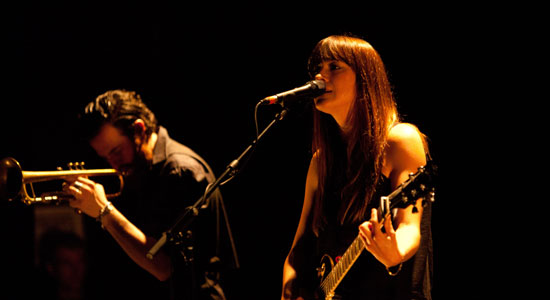
It’s the 32nd annual Festival International de Jazz de Montreal. MAGNET’s Mitch Myers translates the action.
The nights are long, and you have to keep moving at the Montreal Jazz Festival or be left behind. Gathering my strength and several espressos, I began the night at my home away from home, the Gesù, to hear and see Geri Allen & Timeline. Allen is a respected pianist who’s worked in a variety of groups, but what makes Timeline unique is that besides amazing drummer Kassa Overall and bassist Kenny Davis, Allen’s group features tap-dancer Maurice Chestnut. Serving as percussion and stunning visual accompanist, Chestnut’s tap work was alternately fascinating and distracting. I preferred the dialogue between the other three onstage, and Chestnut only performed on some tunes, so thankfully it never was too overwhelming. Note: Overall’s crisp, imaginative drumming was so gosh-darned good that I almost forgot whose group it was. That being said, Allen was so freaking great on the piano that I couldn’t ignore her boss status either. And she even played the blues.
Moving on, I went to catch Marc Ribot’s final appearance of the festival, this time with his band, Caged Funk. Stemming from an adaptive collaboration with fellow guitarist Marco Cappelli interpreting eccentric composer John Cage’s Sonata For Two Voices, Ribot has put together a full-on Cage project. They also assembled an impressive batch of musicians to help complete their vision in Montreal, including legendary keyboardist Bernie Worrell, badass drummer J.T. Lewis, bassist Brad Jones and turntablist DJ Logic. Back in early ’70s, Miles Davis fused the sensibility of Karlheinz Stockhausen with the urban rhythms of Sly And The Family Stone, but this new project has more in common with Sonic Youth’s Goodbye 20th Century, where downtown-NYC rock musicians performed music by once-modern avant-garde “classical” composers like Christian Wolf, Pauline Oliveros and … John Cage. The Caged Funk show was not without its challenges, and it was the second of Ribot’s three nights where the large Théâtre Jean-Duceppe remained half-empty (or half-full). In my opinion, Ribot leaves something to be desired as a master of ceremonies, and he could have engaged his audience more. Not only that, but the band’s material was so obtuse at times that he lost a part of the audience who simply headed for the aisles. Of course, those who stayed caught some truly fascinating performances, and when Ribot directed his mega-talented band to simply grind the funk out of Cage, it was quite an imposing sound. I left before the very end of the show, so I can’t say if they encored with Cage’s 4’33” (joke; look it up), but a little bit of silence might have been all that was really needed here.
Then there was Keren Ann, so color me smitten. Just who is this accomplished, 37-year old Israeli-born/citizen-of-the-world singer/musician/composer/performer? I’m still trying to figure it out, but there is no question that she’s very talented. Playing to a full house at the acoustically challenged L’Astral and working without a rhythm section, Ann was supported only by a second guitarist and Israeli trumpeter Avishai Cohen. Working in close tandem with the affecting singer, Cohen ran his trumpet through an array of electronic effects, providing an atmospheric foil for Ann’s reflective voice. No wonder her songs have been used on shows like Grey’s Anatomy, The L Word and Six Feet Under; this is super-smart, emotive, perceptive stuff, and she’s a doll.
Finally, I settled back at the good old Gesù for a late evening set by French trumpeter Stéphane Belmondo. Belmondo is a rising star of sorts, and the band he brought along to the festival was certainly of fine stature. Veteran drummer Billy Hart, pianist Kirk Lightsey and Parisian bassist Sylvain Romano united easily with Belmondo, and their sound was consistently fresh and exhilarating. Taking the classic jazz idiom and keeping it interesting is no small accomplishment, but these guys did it with effortless style. Besides Belmando’s straightforward playing, Lightsey’s work was totally strong and Hart’s presence a true wonder, driving the band throughout with a minimum of fuss. When it was over, everyone went home sated and happy, and that’s the way they do it in Montreal.






